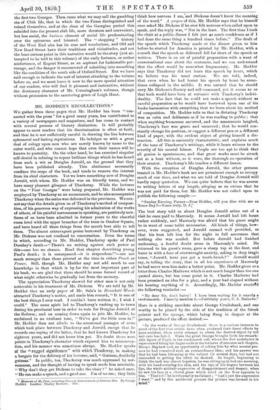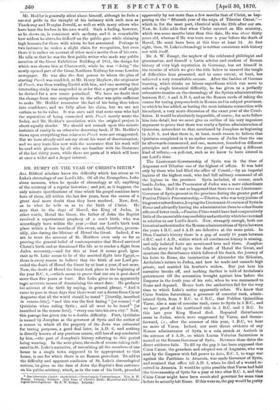MR. HODDER'S RECOLLECTIONS.*
WE gather from these pages that Mr. Hodder has been " con- nected with the press" for a good many years, has contributed to a variety of newspapers and magazines, and has come in contact with several persons of literary distinction. It will probably appear to most readers that his discrimination is often at fault, and that he is not sufficiently careful in drawing the line between ephemeral and lasting reputations. He indulges us with a great deal of eulogy upon men who are merely known by name to the outer world, and who cannot hope that even their names will be known to posterity. On the other hand, he has exercised singular self-denial in refusing to repeat brilliant things which he has heard from such a wit as Douglas Jerrold, on the ground that they have been published already. This abstinence necessarily confines the scope of the book, and tends to remove the interest from its chief characters. Yet we learn something new of Douglas Jerrold, with whom Mr. Hodder was on friendly terms, and we have many pleasant glimpses of Thackeray. While the lectures on the " Four Georges" were being prepared, Mr. Hodder was employed by Thackeray as an amanuensis, and he also accompanied Thackeray when the series was delivered in the provinces. We can- not say that the details given us of Thackeray's method of composi- tion, of his generous way of expressing his admiration of the works of others, of his painful nervousness in speaking, are positively new. Some of us have been admitted in former years to the cheerful room level with the upper branches of the trees in Onalow Square, and have heard all these things from the mouth best able to tell them. The almost extravagant praise bestowed by Thackeray on Mr. Dickens was not confined to conversation. Even the terms in which, according to Mr. Hodder, Thackeray spoke of Paul Dombey's death—" There's no writing against such power as this—one has no chance. Read that chapter describing young Paul's death; it is unsurpassed—it is stupendous!"—are not much stronger than those printed at the time in either Punch or Fraser. Still, though Mr. Hodder may not add much to our knowledge in that which is by far the most important part of his book, we are glad that there should be some formal record of what might otherwise be gradually lost from the memory.
The appreciation Thackeray showed for other men is not only noticeable in his treatment of Mr. Dickens. IVe are told by Mr. Hodder that an early paper of Mr. Sala's in Household Worth; attracted Thackeray's notice, and made him remark, " It is one of the best things I ever read. I couldn't have written it ; I wish I could." The same spirit led to Thackeray's rushing up to town during his provincial tour in order to vote for Douglas Jerrold at the Reform; and on coming down again to join Mr. Hodder, he exclaimed in an exultant tone, " We've got the little man in !" Mr. Hodder does not allude to the occasional passages of arms which took place between Thackeray and Jerrold, except that he records one saying of the latter, that he had known Thackeray for eighteen years, and did not know him yet. No doubt there were points in Thackeray's character which exposed him to misconcep- tion, and his manner was sometimes abrupt. Mr. Hodder speaks Of the 66 rugged significance" with which Thackeray, in making a bargain for the delivery of his lectures, said, " Guineas, decidedly guineas." In public, too, Thackeray was mach oppressed by ner- vousness, and the thought of having to speak made him miserable. " Why don't they get Dickens to take the chair ? " he asked once. " He can make a speech, and a good one. I'm of no use ; they little Memories of My Time, including Personal Reminiscences of Eminent Men. By George Hodder. London: Tinsley Brothers. 1870. think how nervous I am:and Dickens doesn't know the meaning of the word." A propos of this, Mr. Hodder says that he himself once asked Mr. Dickens if he ever felt nervous when called upon to speak, and the reply was, "Not in the least. The first time 1 took the chair at a public dinner I felt just as much confidence as if I had done the same thing a hundred times before." The draft of the speech which Thackeray made at the dinner given to him before he started for America is printed by Mr. llodder, with a remark that the speech as delivered fell far short of the speech as written. There is an air of painful preparation with a want of conversational ease about the sentences, and we can understand that the effect would be somewhat fragmentary. Mr. Hodder says that Thackeray did not learn this speech by heart, which we believe was his usual custom. We are told, indeed, that even when he had learnt his speech by heart ho some- times collapsed in the middle. It was natural that he should envy Mr. Dickens's fluency and self-command, yet it seems to us that both would have been at variance with Thackeray's indivi- duality. The fact that he could not make a speech without as careful preparation as he would have bestowed upon one of his books harmonizes with everything that we learn about his method of composition. Mr. Hodder tells us that in dictating Thackeray was as calm and deliberate as if he was reading in public ; that when anythingthumorous occurred, and the amanuensis laughed, Thackeray's face was grave and unmoved ; that he would con- stantly change his position, or suggest a different pen or a different
kind of paper, with the evident object of giving himself a dis- traction. All this is eminently characteristic, and explains much of the tone of Thackeray's writings, while it bears witness to the severity of his mental labour. People are too apt to think that all genius is spontaneous, and that great works must be struck out at a heat without, as it were, the thorough co-operation of their creator. Thackeray's life teaches a different lesson.
With the exception of Douglas Jerrold, the other persons treated in Mr. Hodder's book are not prominent enough to occupy much of our time, and what we are told of Douglas Jerrold will hardly repay quotation. We can quite believe that he was averse to writing letters of any length, alleging as an excuse that he was not paid for them, but Mr. Hodder was not called upon to publish the following sample :—
" Sunday Evening, Putney—Dear Hodder, will you dine with me on Xmas Day ?—Yours truly, D. J.': The best story told us about Douglas Jerrold arises out of a visit he once paid to Macready. It seems Jerrold had left home rather suddenly, and Macready was afraid that his guest might be in want of some toilet necessaries. All kinds of things, how- ever, were suggested, and Jerrold seemed well provided, so that his host left him for the night in full assurance that nothing else was needed. But before Jerrold had finished undressing, a fearful doubt arose in Macready's mind. He returned to his guest's room, gave a sharp tap at the door, and burst in with a face of overwrought anxiety, asking in deep tragic tones, "Jerrold, have you got a tooth-brush?" Jerrold would say, in telling the story, that in all his experience of Macready
he had never seen him make a better point. Mr. Hodder gives us a letter from Charles Mathews which is not much longer than the one quoted above, but has some point in it. Charles Mathews had been promised an idea for a play, and a year had elapsed without his hearing anything of it. Accordingly, Mr. Holder received the following reminder :—
" My dear Sir, don't hurry ! I have been waiting for it exactly a twelvemonth. I merely mention it.--Faithfully yours, C. J. Mathews."
Here is a striking anecdote about George Cruikshank, and one worthy to be placed by the side of the tradition of the Greek painter and the sponge, which being flung in despair at the picture, produced the effect desired :— " In the works of George Cruikshank there is a curious instance in proof of the fact that artists have often produced their finest effects by pure accident, when every attempt to attain the desired object by toil and care has failed. When the great George brought forth his remark- able figure of Fagin in the condemned cell, where the Jew malefactor is represented biting his finger-nails in the tortures of remorse and chagrin, Horace Mayhew took an opportunity of asking him by what mental pro- cess he had conceived such an extraordinary idea ; and his answer was that he had been labouring at the subject for several days, but had not succeeded in getting the effect he desired. At length, beginning to think the task was almost hopeless, he was sitting up in bed one morning, with his hand covering his chin, and the tips of his fingers between his lips, the whole attitude expressive of disappointment and despair, when he saw his face in a choval glass which stood on the floor opposite to him. That's it!' he involuntarily exclaimed ; "that's just the expression I want !" and by this accidental process the picture was formed in his mind." Mr. Hodder is generally silent about himself, although he feels a natural pride in the thought of his intimacy with such men as Thackeray and Muglas Jerrold, as well as with many others who have been the leaders in his own world. Such a feeling, however, as he shows us, is consistent with modesty, and it is remarkable how seldom he obtrudes hiniself on the public gaze while claiming high honours for those with whom he has associated. Perhaps in two instances he makes a slight claim for recognition, but even there it is rather on account of other men's merits than of his own. He tells us that he was the first public writer who made any public mention of the Great Exhibition Building of 18M, the design for which was shown him at Chatsworth, while he was " doing " the newly opened part of the Great Northern Railway for some London newspaper. He was also the first person to whom the plan of starting Punch was confided, as Mr. Henry Mayhew, the originator of Punch, was then reading Euclid with him, and one morning that interesting study was suspended in order that a proper staff might be devised for a new comic periodical. We have no doubt that the change from one occupation to the other was quite sufficient to make Mr. Hodder remember the fact of his being thus taken into confidence, and we fully allow his claim, but we are not certain as to its value. It was once said that some man who had the reputation of being connected with Pouch merely wrote the Index, and Mr. Hodder's association with the original project is about equally slender. We should not remark upon this minute instance of vanity in an otherwise deserving book, if Mr. Hodder's views upon everything that relates to Punch were not exaggerated. But we have already said our say about his want of discrimination, and we may leave him now with the assurance that his work will be read with pleasure by all who are familiar with the literature of the last thirty years, while there are parts of it which will have at once a wider and a deeper interest.



































 Previous page
Previous page